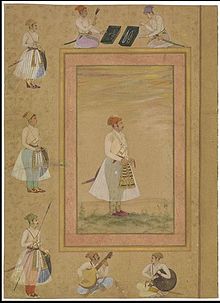| Amir-ul-Umara Mirza Raja Ram Singh I | |
|---|---|
| Raja of Amber | |
 | |
| Raja of Amber | |
| Reign | 28 August 1667–10 April 1688 |
| Coronation | 10 September 1667 |
| Predecessor | Jai Singh I |
| Successor | Bishan Singh |
| Born | 22 August 1629 Amber,Rajputana |
| Died | 10 April 1688 Kohat, Pakhtunkhwa, Mughal Empire |
| Spouse | Hadiji of Kota
Rathorji Ram Kanwarji of Marwar Chauhanji Anup Kanwarji of Nimrana in Amber Bagheliji Shyam Kanwarji of Rewa in Baghelkhand |
| Issue | Yuvraj Kishan Singh (died in teenage) |
| Dynasty | Kachwaha |
| Father | Jai Singh I |
| Mother | Jadonji Anand Kanwarji d.of Raja Mukundpal Dev Ji of Karauli |
| Religion | Hinduism |
Mirza Raja Ram Singh I was the Raja of the Kingdom of Amber and head of the Kachwaha Rajput clan, succeeding his father Mirza Raja Jai Singh I. He also served as the general of the Mughal Empire and commander-in-chief of its army as well as the Subahdar of Kashmir.
He was commissioned by the Mughal Emperor Aurangzeb as a commander of 4000 in 1667[1] to invade the Ahom Kingdom of present-day Assam,[2] but the loss at the Battle of Saraighat (1671) and the subsequent retreat[3] led to his recall to the capital and following disgrace and a downfall in rank and order at the imperial Mughal court which though lasted for a short span of time, rejuvenated by his great-grandson Maharaja Sawai Jai Singh II[4] in the beginning of 18th century.
- ^ "Learning of the loss of Kamrup on 19th December 1667, Aurangzeb decided to at once retrieve imperial prestige and regain lost dominion" (Sarkar 1992:211)
- ^ "(Aurangzeb) commissioned Ram Singh of Amber, son of the distinguished general Mirza Rajah Jai Singh, and a commander of 4000, to lead an invasion of Assam." (Sarkar 1992:211)
- ^ "Weakened by repeated defeats and consequent losses and losing all hopes of recovering imperial grace by defeating the Ahom monarch, Ram Singh left Kamrup in early April 1671 and returned to Rangamati." (Sarkar 1992:227)
- ^ "Aurangzeb at once demoted the Rajput general by 2000 and ordered his recall. Accordingly, he made over charge to Abu Nisar Khan and had audience with the Emperor on 25 June 1676." (Sarkar 1992:228)